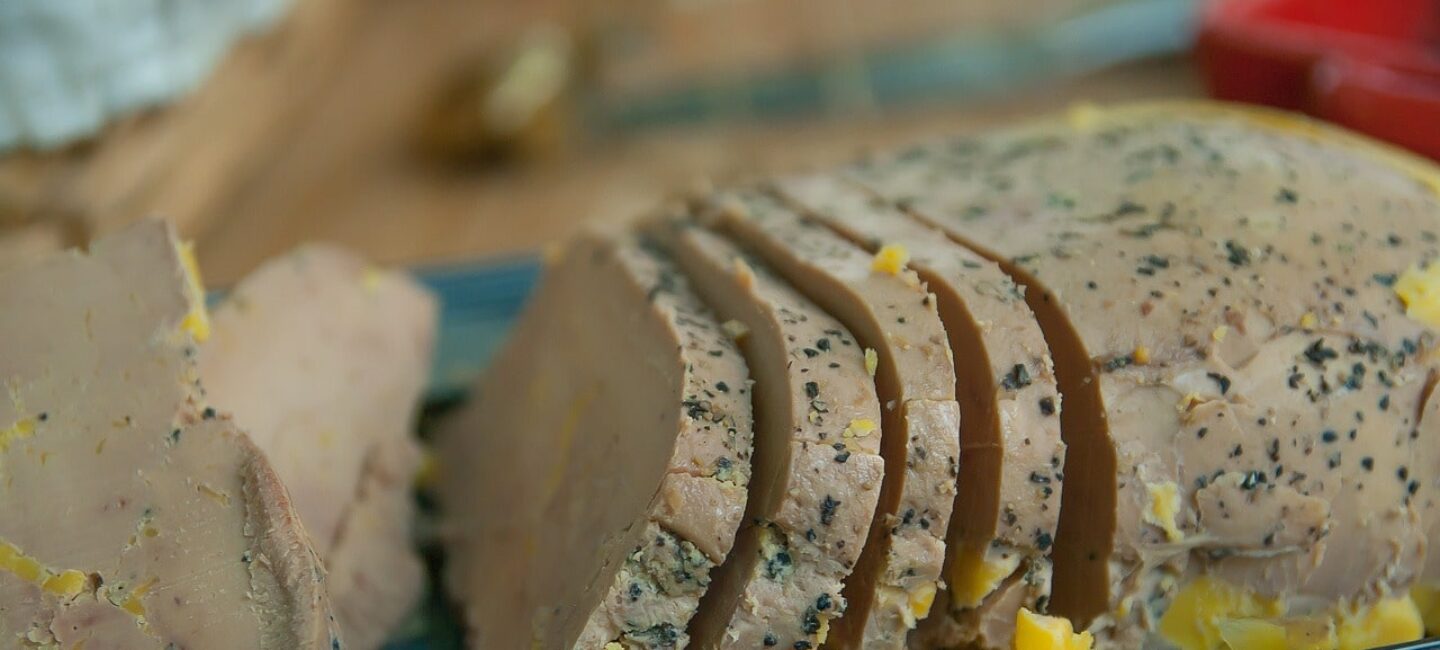
Food and pregnancy… It’s an endless list of daily questions! Especially when the holiday season is approaching. What you can eat, what you can’t, what’s better to avoid or limit…
And what about foie gras? Here’s everything you need to know!
Can I eat foie gras during pregnancy?
Here’s the good news right away: foie gras during pregnancy is a yes! With a few conditions, of course.
✅ If your foie gras is cooked (usually in a jar), it’s safe! You can enjoy it without worry (though still in moderation).
❌ However, bad news for raw foie gras or semi-cooked foie gras, as well as homemade ones: they are strongly discouraged during pregnancy!
Also, a little general reminder: during pregnancy, it’s better to limit foods made from liver. Animal livers are high in vitamin A. While vitamin A is important during pregnancy, consuming too much of it can also cause complications. So it’s best to be cautious.
And, since at May we answer lots of questions on this topic daily, while we’re talking about precautions, here’s a quick reminder list of healthy eating practices during pregnancy:
Regarding animal-based products
- Avoid raw or undercooked meat, eggs, or fish.
- Also to be avoided: smoked or marinated meats and fish, and raw deli meats.
- Avoid cooked deli meats (rillettes, pâtés, etc.).
For cheeses
- Avoid all raw milk cheeses.
- Remove the rinds.
About fruits and vegetables
- Thoroughly rinse foods that have been in contact with soil.
- Avoid raw sprouted seeds (soy, alfalfa, etc.).
Hygiene tips
- Always wash your hands thoroughly.
- Use clean utensils.
- Regularly clean the refrigerator and keep raw and cooked foods separate.
What are the risks associated with eating foie gras during pregnancy?
Now that we’ve reviewed the basics, let’s get back to our foie gras. Like a number of other foods (unfortunately), foie gras can lead to certain pregnancy complications if proper precautions aren’t taken.
By “risks of complications,” we mainly mean those linked to toxoplasmosis, listeriosis, and salmonellosis.
Toxoplasmosis
Toxoplasmosis is an infection caused by a parasite, often mild and asymptomatic, usually contracted by eating contaminated raw or undercooked meat.
This infection may be harmless for adults… but not for a fetus! Toxoplasmosis can cross the placental barrier, in which case it’s called congenital toxoplasmosis.
For the fetus, this infection can lead to visual impairment, brain development issues, psychomotor delay, premature birth, or even fetal death.
Keep in mind, we’re talking about risks: not only are transmission risks low, but in 90% of cases, the baby is born without symptoms. So the risks are low but serious — it’s worth waiting a few more months before eating raw meat.
Listeriosis
Listeriosis is a disease caused by listeria, a very common bacterium. This bacterium withstands cold very well (which is why fridges must be cleaned regularly) and generally causes fever.
This illness is dangerous for the fetus because it can lead to miscarriage, premature birth, or severe neonatal infection. Caution is essential!
Listeria “colonizes” foods like soft or fresh cheeses, as well as raw or undercooked meat, eggs, or fish.
Salmonellosis
Also caused by a bacterium (salmonella), this infection can lead to acute gastroenteritis (fever, diarrhea, vomiting, abdominal pain…).
It’s contracted by consuming contaminated and/or undercooked foods, even raw ones (like meat, eggs, and fish).
Salmonellosis is problematic not only for the mother, as it can cause dehydration (a complication of gastroenteritis), but also for the fetus, since the infection can be transmitted (though risks remain low).
In short, the risk almost always comes from consuming a product — particularly meat — that isn’t cooked enough. Conclusion: for 9 months, say goodbye to homemade, raw, or semi-cooked foie gras.
If you notice any symptoms that worry you during pregnancy, consult your doctor. In case of an issue, follow-up and possibly treatment are essential to ensure everything goes well for both you and your baby.
Want to learn more? Feel free to download the May app, where you’ll find plenty of resources to support and guide you throughout your pregnancy.
Are there substitutes for foie gras during pregnancy?
After reading all this, the idea of eating foie gras might not sound so tempting anymore, even though, to reiterate, cooked foie gras in a jar is not risky if prepared under good hygienic conditions.
So what to serve as a starter instead? Why not try a vegetarian (no animal flesh) or vegan (no animal products) appetizer?
It could be the perfect opportunity to discover new recipes! Here’s one of our favorites, shared on May by Marion Destannes:
Savory crumble
For 6 servings
Preparation time: 20 minutes
Cooking time: 45 minutes
Ingredients:
- 1 butternut squash (about 1 kg), cut into large cubes
- 1 sliced onion
- 100 g shiitake mushrooms, rinsed and chopped
- 1 drizzle of olive oil
- 50 g grated parmesan or nutritional yeast (for a vegan alternative)
- 50 g hazelnut or almond powder
- 50 g rice flour
- 50 g buckwheat flour
- 1 minced garlic clove
- 1 tsp finely chopped rosemary or Provençal herbs
- 1 tbsp mustard
- 4 tbsp olive oil
- Salt, pepper
Preparation:
- Preheat your oven to 180°C (th. 6).
- In a pan, sauté the onion in olive oil with the shiitakes, butternut squash, and a pinch of salt and pepper.
- Prepare the crumble by mixing all the dry ingredients, then add olive oil and mustard. Work the mixture with your fingers until it forms a crumbly dough.
- Place the vegetable mixture in a baking dish. Cover everything with the crumble.
- Bake for 45 minutes at 180°C (th. 6).
We could go on and on, but we’ll let you find your own perfect recipe! For inspiration, the book “Ma grossesse sereine et gourmande” by Marion and Elise Destannes (a midwife from the May team!) can be a great ally. And pssst… you can also find many more of Marion’s recipes on May!
Foods to avoid during the holidays when pregnant
If we recap the foods to avoid during pregnancy despite the festive season, here’s what we get:
- Raw or undercooked meat, eggs, and fish (including surimi, shellfish, and deli meats),
- Raw milk, soft, or fresh cheeses,
- Raw milk (unless it has been boiled before consumption),
- Foods past their expiration date,
- And of course, alcohol — but you already know that one.
Okay… we agree, this list includes quite a few foods typically found on a Christmas table. Don’t worry, creating a pregnancy-friendly holiday menu isn’t impossible — quite the opposite! Here’s an example:
Appetizer: Sure, no alcohol — but so what? There are plenty of alcohol-free drinks that can make your meal just as festive. Online, you can find recipes for nearly all your favorite cocktails in alcohol-free versions.
Starter: As we’ve seen, cooked foie gras in a jar is perfectly fine! You can also get creative and try a vegan or vegetarian option. However, avoid raw oysters, surimi, caviar, and lumpfish roe (thanks to listeriosis risks).
As for smoked salmon, opinions vary. If it’s vacuum-packed, some professionals might say it’s fine — but the real impact on the fetus isn’t well understood.
Main course: Here you have free rein, with one rule: everything must be thoroughly cooked! Capon, poultry, scallops — treat yourself. Just one small piece of advice: avoid large game meats that might contain lead traces. And watch out for alcohol-based sauces!
Cheese board: Comté, Gouda, Etivaz, Gruyère… all good! Hard cheeses that aren’t made from raw milk are welcome on your table.
Dessert: Why not go for an ice cream log without raw eggs? Ask your baker or pastry chef to make sure it’s safe while still delicious.
A festive, pregnancy-friendly holiday menu — it may sound tricky, but it’s absolutely doable, with a nice, well-cooked foie gras as the star of your table!
Photo: ©jackmac34, Pixabay
This text was translated from French by an artificial intelligence. The information, advice, and sources it contains comply with French standards and may therefore not apply to your situation. Make sure to complement this reading by visiting the May US/UK app and consulting the healthcare professionals who are supporting you.




